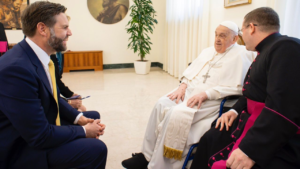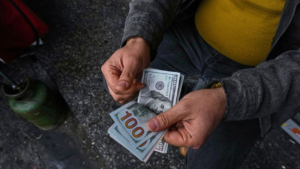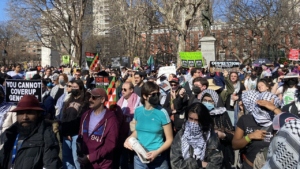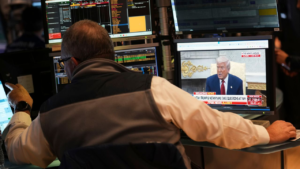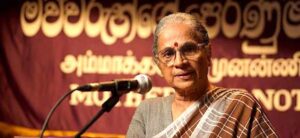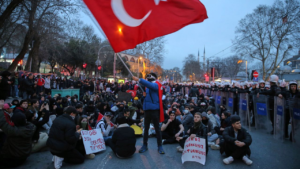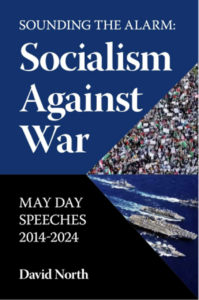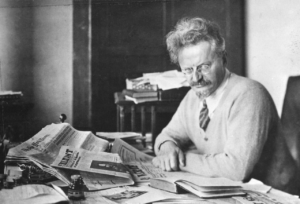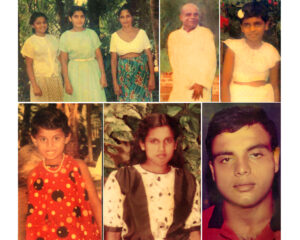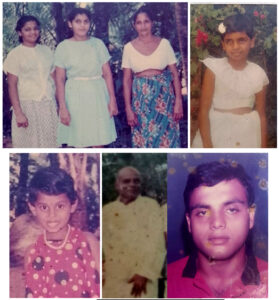By Nandana Nanneththi.
The Sinhala section of the World Socialist Web Site (WSWS) reported recently that a group of Jaffna University students raised the following question to the Socialist Equality Party (SEP) of Sri Lanka: “There is a widespread global protest movement supporting the Palestinians; But during the war in Sri Lanka, when the government carried out a genocide against the Tamil people, there was no such global movement to support us. why is that?”
What they are questioning is about the brutal attack by the Colombo government in 2009 in Mullivaikkal, where 150,000 Tamil people were trapped in an area of 14 square kilometers, just like what is happening in the Gaza Strip today. There is no reason for the pain in the hearts of these people to go away automatically, who were shaken by human feelings, exacerbated by the truth that the world betrayed them, when they were made helpless and subjected to cruel treatment and tortuous conditions.
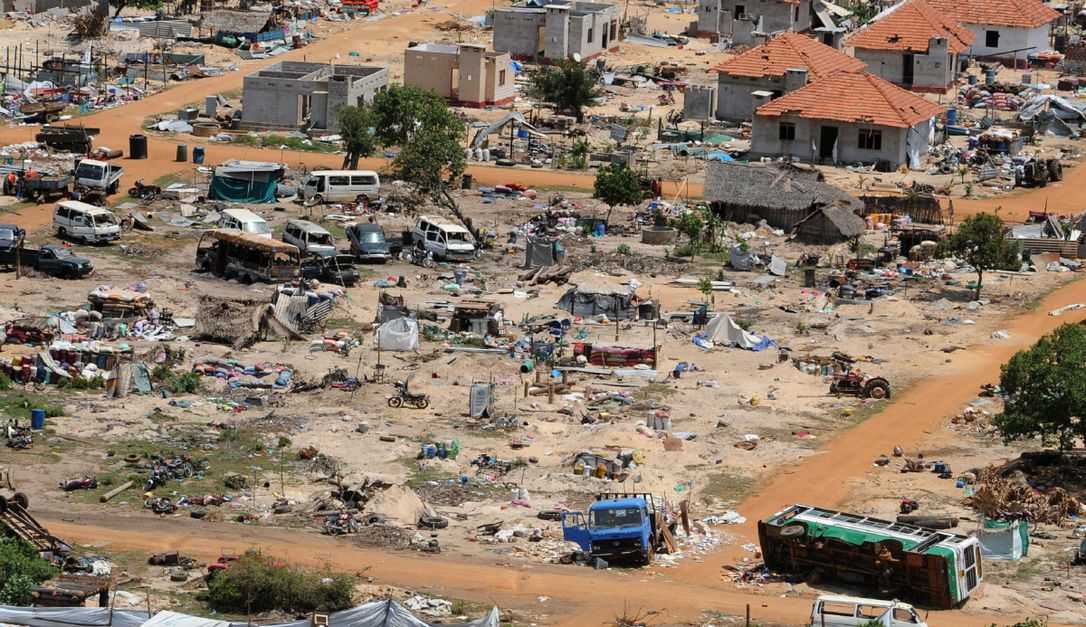
But, instead of facing this reality, the SEP, through an article published in Sinhalese on the World Socialist Web Site (WSWS) on January 24, authored by Navin Devage, titled “A Reply to the Political Questions Promoted by Tamil Nationalists Among Jaffna University Students Regarding the Gaza War,” is attempting to narrow down the crisis of the Tamil people as a mere product of Tamil nationalists, pretending that there existed a global protest movement to fight against the Tamil Genocide.
Accordingly, “the claim that there was no global opposition to the genocide against the Tamil people during the war in Sri Lanka is false,” writes the SEP, pointing out the campaigns of the Tamil diaspora who were exiled from the island as a result of the war, such as, “8000 Tamils in Central Berlin marched from the CDU headquarters to the Indian Embassy”, “a hartal movement took place in Tamil Nadu”, “50,000 Tamils protested in Paris”, etc. The question that has arisen now is the fact that the cries of the oppressed Tamils, from within the country and abroad, for the protection of their lives in the last genocidal attack by the government forces, did not receive a favorable response from the world.
To elaborate further, all the radicals, left parties and trade unions in Sri Lanka as well as in other countries, were engaged in the “war against terrorism” campaign unleashed by US-led imperialism at that time. The left parties of Sri Lanka were already smearing the blood of the oppressed Tamils on their hands. Temples and churches had become centers blessing the attrocities against Tamil people. The racists came to the fore, suppressing the progressive artists. Racist films and other creations had become part of popular culture. Unions encouraged their membership to donate wages to war funds. Creation of a horrified graveyard in the north was celebrated with milk rice (The traditional Sri Lankan food of celebration). In the midst of all this, with the massive escalation of military attacks in 2009, in order to cover up the massacres on the ground, the Rajapaksa government announced that it could not assure the safety of the lives of journalists and even of the Red Cross members. The oppressed Tamil people who did not then have smartphones, and access to Facebook and social media platforms, did not have the ability to share the events of the bloody tragedy that was unfolding before them, as in Gaza today. In this way, by the time of the final onslaught, the fact that a reactionary pro-war mass sentiment had been built against the Tamil people in the southern partk of Sri Lanka, gave the government an easy war victory.
The effort made in the article, to insinuate that the resistance to the genocide of the Tamil people in Sri Lanka was included as a common slogan of the mass struggles around the world, which were erupted by the global economic and financial crisis of 2008, is similarly false.
This objective reality must be overcome by a genuine movement of the working class. Instead, it is naive to try to console the Tamil people by distorting the reality and to say that such an idea was promoted by the Tamil elite, and to assume that the oppressed people can be hence freed from the influence of Tamil nationalism. It should be specially noted here that the article is written with the good intention of liberating the oppressed Tamils from reactionary nationalism, but the way followed to achieve it goes against the very objective. In other words, the purpose itself has revealed that the way followed to achieve it is unfair.
Against this distortion of the said article, we have to note that it was only the SEP, the WSWS and the ICFI, that have been carrying out a principled fight against the communal injustice and racist war against the Tamil people in the North-East of the country, by launching an international campaign and presenting a socialist program, over three decades uninterruptedly.
The February 4, 2009 WSWS editorial board’s statement quoted in the SEP article itself makes things clearer:
“Working people internationally have shown mass opposition to their governments’ support for the wars in Afghanistan and Iraq and horror at the war crimes in Gaza. They will feel the same way if made aware of the situation in Sri Lanka. Tamil workers must link their struggles with that of workers all over the world against the common imperialist enemy.”
According to the article, “…by puffing the formula of problems unique to the Tamil people and a Tamil solution, what the students’ union is actually doing is to prevent such a united struggle of the oppressed of all races and creeds against the outdated social order – that is their common enemy – in which the capitalist ruling elite holds political power.”
In this way, the SEP leadership is exposing a struggle carried out within the party on the issue of whether the Tamil people have had no special problems. It is an illusion of the SEP leadership to believe in winning over oppressed Tamils to the international working class program, while denying to recognize the special discriminatory circumstances of Tamil people and thereby standing with the same infamous capitalist slogan.
As stated in the February 4, 2009 WSWS editorial board’s statement quoted in the SEP article, “ The allies of the Tamil people in Sri Lanka and in the diaspora in the imperialist countries are the working class. It is the only social force with the power and whose class interests lie in ending the war, overthrowing the Sri Lankan bourgeois state, and ensuring the democratic rights of the Tamil population, as part of the struggle against the imperialist world order.”
Thus, “SEP the Sri Lanka branch of the International Committee fights to build a revolutionary alliance of Sinhala and Tamil working class and peasants to form a socialist united republic of Sri Lanka and Eelam. The democratic or social aspirations of the people cannot be realized under capitalist rule in Sri Lanka or within the confines of the nation-state system established in the Indian subcontinent in 1947-1948. The backwardness of Sri Lanka and Eelam, which is the result of the colonial past and continued imperialist rule, can only be overcome by the establishment of a worker-peasant government as part of the world socialist revolution.” [The SEP and the fight for the Socialist United States of Sri Lanka and Eelam, ICFI on release of SEP members by LTTE, December 1, 1998]
SEP and its pioneer RCL fought for decades for this perspective of the Sri Lanka-Eelam Socialist Republic. The said article refrains from mentioning the term, “Sri Lanka-Eelam”. We know that there is an “inevitability” behind every coincidence, even though it may appear to be a coincidence. Later, according to the policy developed by the SEP leadership, ‘Tamil people have no special problems’ compared to Sinhalese majority working class; If so, there is no question of the right to self-determination. It means that the national question is resolved automatically, already, with or after the defeat of the LTTE by the Colombo government. Then this ‘Sri Lanka-Eelam’ slogan cannot be valid. That is the very inevitability that caused it to disappear from the article.
As the SEP had pointed out from the beginning, the end of the war with the victory of the Colombo government suppressing the Tamil people’s struggle in the North, was opening up space for the suppression of the working class in the south. Also, the end of the war led to the strengthening of the right wing. It happened in the context of a pre-emptive strike by the ruling class against a possible popular uprising in the South. Buddhist extremist attacks started by the end of 2009 against other religions, the state campaign of extrajudicial killings under the guise of suppressing the underworld, continued unhindered with the approval of all the media and the majority of the middle class. The Party’s response was a belated, half-hearted one.
This policy went to the extent of the party’s tacit approval of the government’s move to forcibly cremate Muslim corpses during the Covid pandemic. In the face of these attacks, instead of continuing the struggle on the basis of its own history, it adapted to the status quo, taking a rest. These diluted responses of the party have reflected that the party was directed to adapt a little, in order to avoid isolation caused by the hostile attitudes against the party developed in the Sinhalese majority South, throughout the determined struggle that party carried out over three decades, based on the slogans calling not to give one cent, one man or one drop of blood to this war and to withdraw troops from the North and the East.
The theoretical conclusion of the International Committee that the campaign for self-determination of a nation understood as a right up to freedom of secession plays a regressive role in the context of a tendency to fragment states into Imperialist-backed statelets, and the rightward movement of national liberation movements and of all national political movements, including trade unions, consequent to the globalization of production, was employed by the party leadership to justify its adaptation. Accordingly, they argued that there is no question of self-determination anymore. Even the talk of self-determination was interpreted as representative of separatism and support for imperialism.
According to the International Committee, the demand for self-determination, as the right to freedom from national oppression, which is clearly a transitional demand, has not been used since Lenin’s time to promote the formation of a separate state. As long as we could subjugate it to the working-class strategy of united mobilization for the socialist perspective, we have fought for it firmly. As the current crisis exacerbates pressure on national groups, democratic issues including self-determination have emerged more acutely than ever. But, it must be based on the truth,”that the essential progressive content of ‘self-determination’—the eradication of national oppression—can be realized only through the SEP’s program for the Socialist United States of Sri Lanka and Eelam.” [The SEP and the fight for the Socialist United States of Sri Lanka and Eelam, ICFI on the release of SEP members by LTTE, December 01, 1998]
To elaborate further, “To the extent that the nation-state persists as a basic unit of political and economic organization of bourgeois society, the national question—which, at this point in history, would be more aptly called the “national problem”—persists. But Marxist tactics flow from a scientific understanding of the historical obsolescence of the national state. (David Noth, The Russian Revolution and the Unfinished Twentieth Century) As long as the working-class party avoids it, pro-imperialist, national separatist opportunism would build its kingdom on it.
The SEP article defects from that responsibility. Its distinguishing feature is its rejection of the historical materialist method. The writer selects only the things he prefers from the whole composition, and from it, arrives at the conclusions he is biased towards. In emphasizing the lessons of the 1985 split, the leadership of the International Committee has pointed out correctly on many occasions that, when pragmatism is thrown out of the front door, it creeps in through the back door. The revolutionary should carefully be aware of this.

